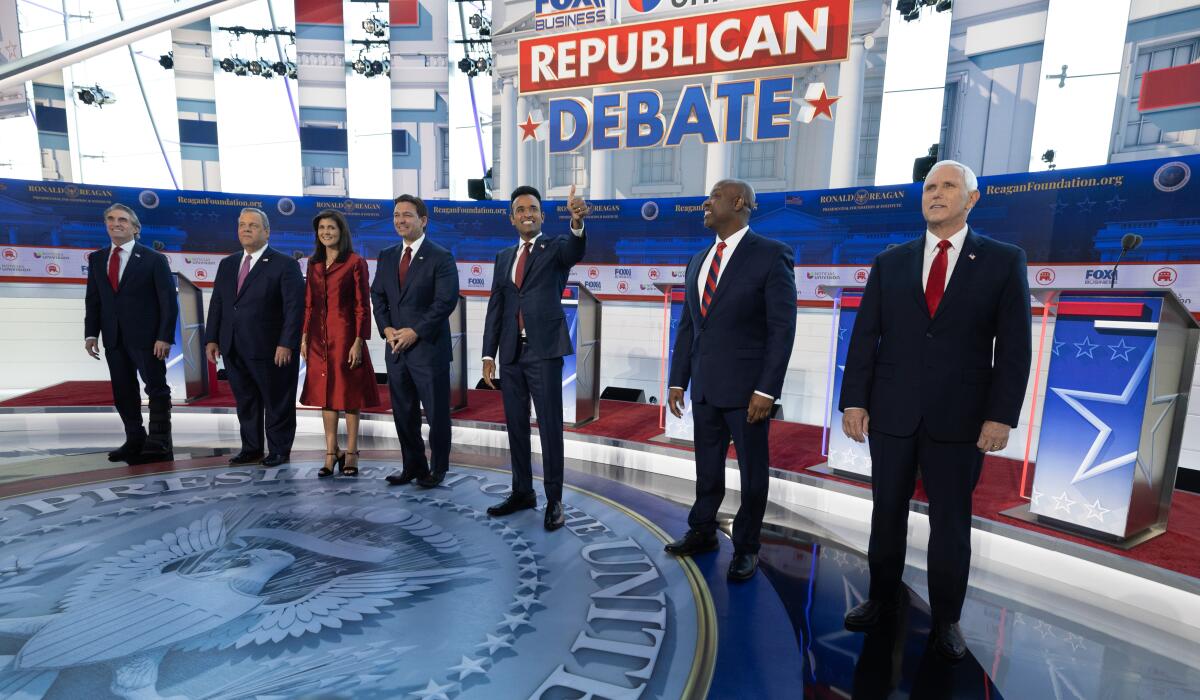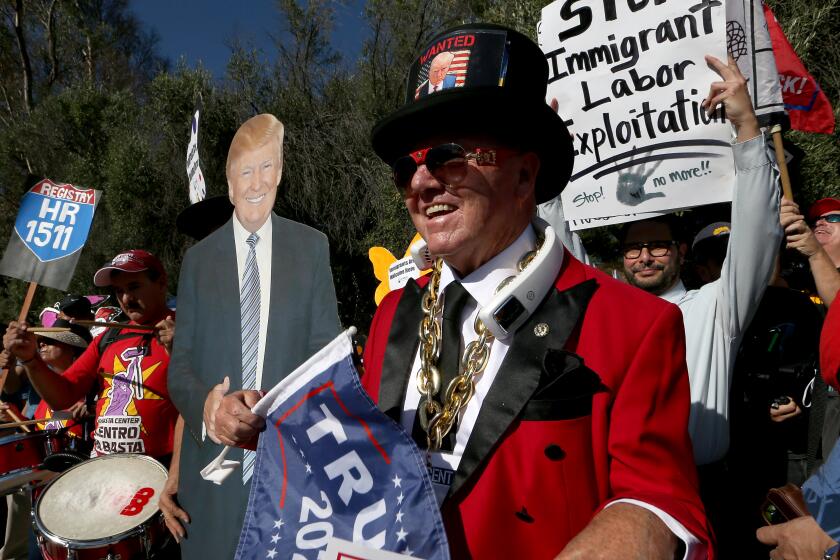5 takeaways from last nightâs Republican presidential debate

WASHINGTON â Republican presidential candidates â with the notable exception of the front-runner, former President Trump â held the second primary debate Wednesday night at the Reagan Presidential Library in Simi Valley.
Hereâs what happened when seven other GOP candidates faced off:
Trump took fire for being a no-show, but his opponents didnât highlight his biggest vulnerabilities
Trump skipped the debate and is not likely to lose his commanding lead in Republican primary polls. He is averaging more than 50 percent of the vote.
Donald Trump was absent as Republican candidates clashed in a debate at the Ronald Reagan Presidential Library, but his supporters made up for it.
Some of the candidates on stage took a few shots at Trump, mostly for not showing up. But voters who tuned in to Fox News Channel, Fox Business Network or Univision to watch the debate did not hear much about the former presidentâs string of criminal indictments, his attempts to overturn the 2020 election or his threats to use the White House to punish his enemies were he reelected.
Former New Jersey Gov. Chris Christie, as usual, went the hardest at Trump, criticizing his compliments for Russian President Vladimir Putin, his lack of progress on a border wall and his divisive brand of politics.
âThis guy has not only divided our party, heâs divided families all over this country,â Christie said. âHe needs to be voted off the island.â
But Christie, who is basing much of his campaign on a critique of Trump, is not gaining much traction in polls.
The response to Christie from entrepreneur Vivek Ramaswamy, whose campaign has centered on his fealty to Trumpâs âMake America Great Againâ agenda, was more emblematic of how Trumpâs rivals have approached him.
âTrump was an excellent president,â Ramaswamy said, âbut the âAmerica firstâ agenda does not belong to one man.â\
No one seized the mantle of No. 1 Trump alternative â but Haley took some shots
Florida Gov. Ron DeSantis, once Trumpâs top rival, failed to stand out, showing only slightly more verve than he did in the initial debate last month.
Former South Carolina Gov. Nikki Haley, who won praise after the first debate, did the most to assert herself this time around as well. She attacked Ramaswamy for embracing Chinese-owned TikTok â âEvery time I hear you, I feel a little bit dumber from what you sayâ â went after DeSantis for supporting his stateâs offshore drilling ban, and even took on her fellow South Carolinian, Sen. Tim Scott, over his service in Congress as the federal debt soared.
The exchanges could earn Haley a boost of media attention, like the one she got after the first debate. But she has yet to break through in public opinion polls, winning an average of 6.3% support of Republican voters, according to FiveThirtyEight, a poll aggregator.
The end of optimism
The candidates spoke early and often of Ronald Reagan as they stood beneath a retired Air Force One plane in his presidential library. But, with few exceptions,they didnât offer much of the Gipperâs famous optimism.
Voters heard about failing students, out-of-control crime, fentanyl deaths, Mexican drug cartels and the rise in transgender identification, which was portrayed as a âmental health disorderâ afflicting the nationâs youth.
âI come before you today as a candidate for president because I think this countryâs in a lot of trouble,â said former Vice President Mike Pence, who has cast himself as an heir to Reaganâs policies and political style. âYou hear the fire on the stage tonight, you hear the fire and all of our voices, and itâs because Joe Biden has weakened this country at home and abroad.â
The dark view is more evidence of the influence of Trump, who famously warned of âAmerican carnageâ in his inaugural address. But it also reflects the mood of much of the American public. Republicans, in particular, tell pollsters they are anxious about the countryâs future.
The GOP is moving further right on immigration and the border
No one defended President Reagan when the moderators showed video of him supporting a 1986 amnesty for nearly 3 million people who had entered the U.S. illegally.
On the contrary, DeSantis and Haley both called for use of U.S. military force in Mexico, which would probably be viewed as a violation of Mexican sovereignty. âItâs how we deal with our terrorists,â Haley said, explaining her plan to use special operations forces to break up drug cartels.
âOur own country is being invaded,â DeSantis said.
In another telling moment, Pence would not say whether he supported a deal with Congress to protect so-called Dreamers, who were brought to the country illegally as youths, from deportation. That group once enjoyed bipartisan support.
Polls show immigration is a top issue for Republican primary voters, second only to inflation in some surveys. And voters across the board have generally given the Biden administration low marks on the issue. An NBC News poll released this week gives Republicans a huge advantage â 50% to 20% â on the question of which party would do a better job handling border security.
Republicans are divided over how to address the autoworkersâ strike
The Republican Party has embraced a right-wing form of populism in the Trump era, but that has not translated into support for labor unions. No candidate sided with the United Auto Workers strike against the Big Three automakers, but the rhetoric of some candidates showed the GOP is wary of offending the workers.
Scott took the traditional Republican stance, accusing the autoworkers of demanding â4-day French work weeks.â
The other candidates steered clear of attacking union membersâ demands and instead went after other targets. Ramaswamy and Pence criticized the âunion bosses,â with Pence accusing them of fomenting class warfare. Haley said the workers should be picketing the White House, blaming Bidenâs spending bills for inflation that has hurt earning power. North Dakota Gov. Doug Burgum said Biden was at fault for interfering with the markets by subsidizing electric cars.
The issue presents a test for a party that has grown dependent on blue-collar workers in manufacturing states such as Michigan and Pennsylvania that could decide the general election.
Trump seems to understand the stakes. As his opponents debated in California on Wednesday night, he was in Michigan, warning that the auto industry was âbeing assassinatedâ by electric vehicles.
âYouâre all on the picket lines and everything, but it doesnât make a damn bit of difference what you get,â he said. âBecause in two years, youâre all going to be out of business.â
More to Read
Get the L.A. Times Politics newsletter
Deeply reported insights into legislation, politics and policy from Sacramento, Washington and beyond. In your inbox three times per week.
You may occasionally receive promotional content from the Los Angeles Times.












